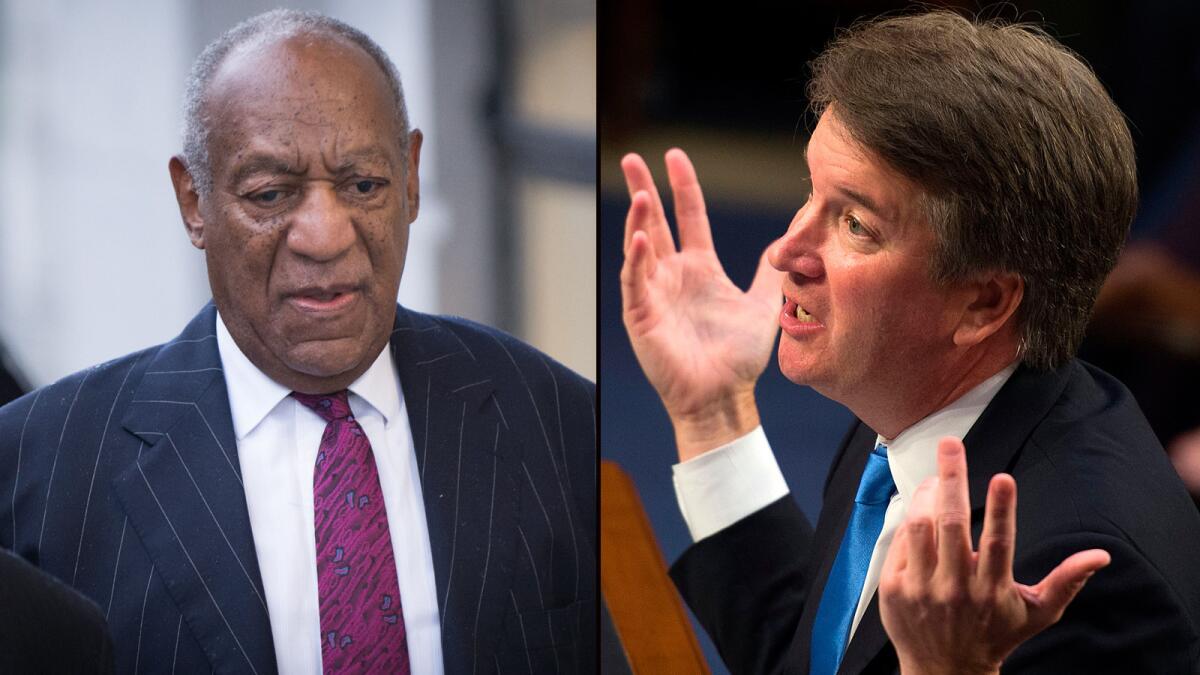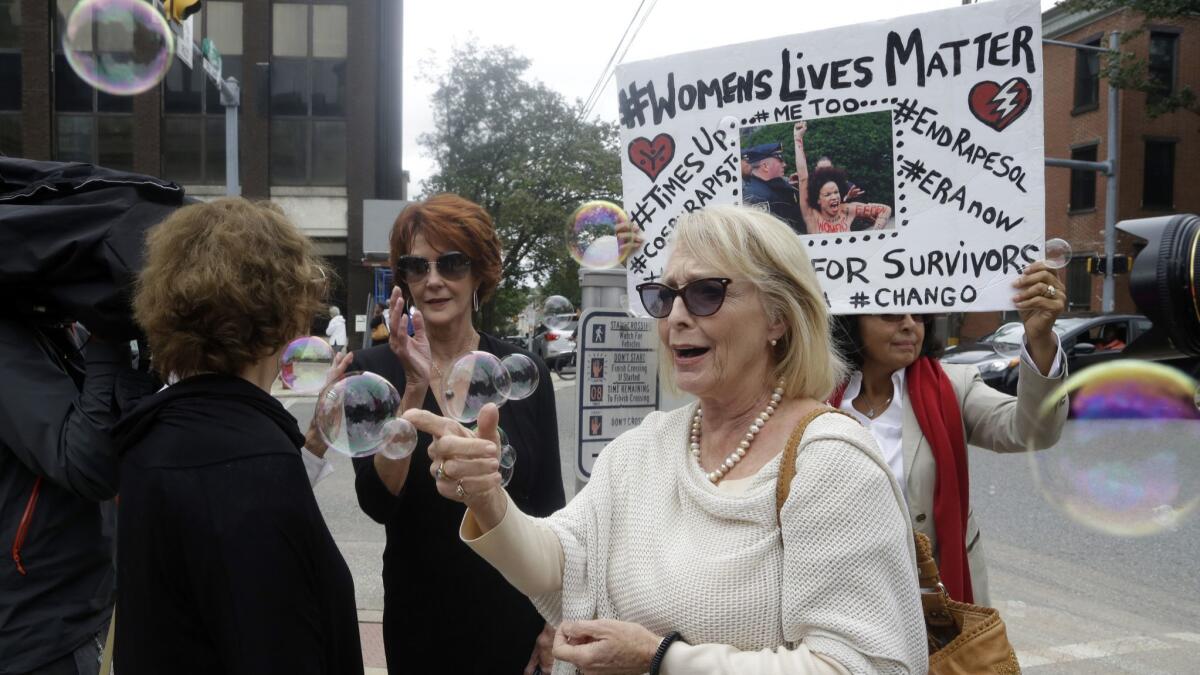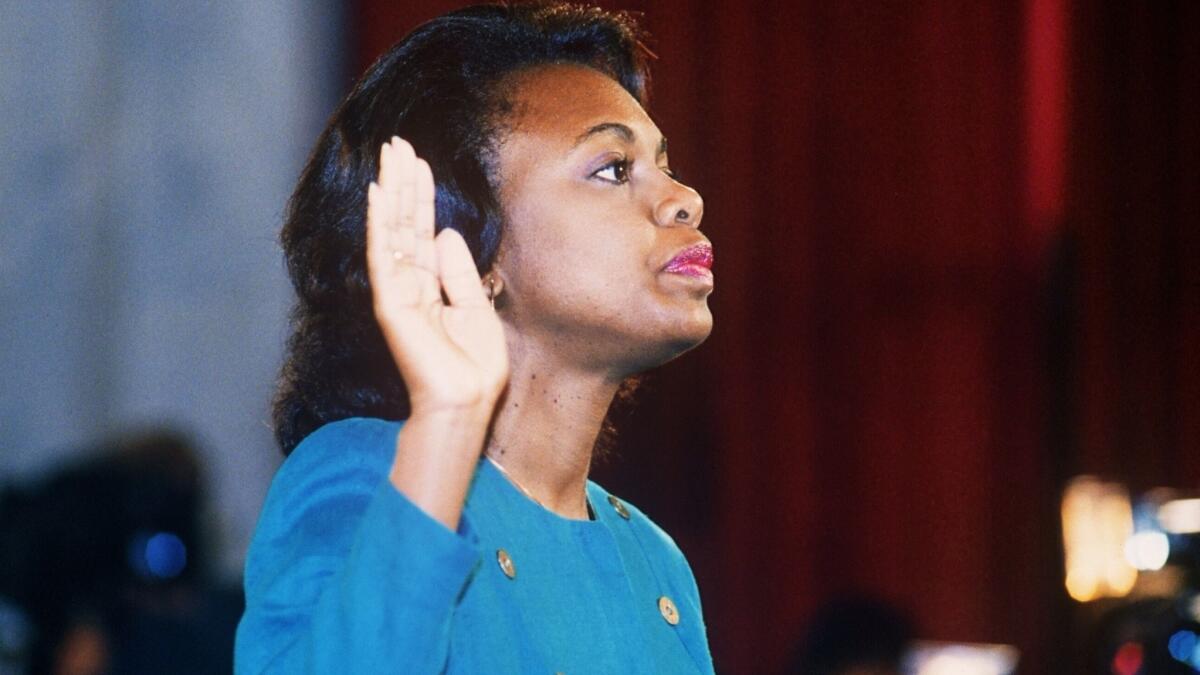Commentary: Bill Cosby in handcuffs, Brett Kavanaugh questioned: Why this is more than a #MeToo moment

In the most visually stunning moment of the #MeToo era, former American icon Bill Cosby was led away from a Pennsylvania courtroom in handcuffs Tuesday.
The partially blind comedian who once attracted throngs of fans and Hollywood paparazzi on his many walks down the red carpet now shuffled along a drab courtroom corridor flanked by a burly law enforcement official. He walked gingerly toward a 3-10 year prison sentence, his eyes seemingly shut.
But it was eyes wide open for the rest of the country who signed on or tuned in to witness a cultural reckoning playing out on their smartphones, YouTube streams, televisions and alert-filled newsfeeds.

Cosby was sentenced Tuesday to three to 10 years in state prison, the first celebrity of the #MeToo era to be locked up.
Cosby, 81, was caught on camera for a few seconds before he was ushered out of sight, but the brief scene spoke volumes. Decades-worth of sexual abuse victims who’d remained silent out of fear or shame, or who were brave enough to come forward but had their claims dismissed or who had their rape allegations turned against them in a second act of humiliation, vicariously had their day in court.
Judge Steven O’Neill referred to Cosby as a “sexually violent predator” while sentencing him for the 2004 assault of Andrea Constand on three counts of aggravated indecent assault, which he was convicted of in April. “It is time for justice, Mr. Cosby. This has all circled back to you,” said O’Neill. “The day has come. The time has come.”

PERSPECTIVE: Bill Cosby and the complicated heartbreak of a hero’s fall from grace »
Call it a sea change, a groundswell or a seismic shift, but whatever this new and powerful phenomenon is, it’s more than just a #MeToo moment. It’s the upending of a pervasive culture where the victimization or degradation of women was simply considered collateral damage on a mogul’s or CEO’s path to glory … or a judge’s path to the Supreme Court.
The hashtag revolution, which gained steam a year ago under rallying cries that included #MeToo, #MyHarveyWeinstein and #WhatWereYouWearing, had evolved into an actionable, tangible move toward justice.
The Tuesday sentencing seemed to say that if Cosby could be brought down by his abhorrent behavior, anyone could. There’s no shortage of cases where Cosby’s stunning fall from grace surely serves as a victorious guiding light or terrifying cautionary tale.
SCOTUS hopeful Brett Kavanaugh may or may have not been listening when the Pennsylvania judge addressed concerns over Cosby’s decimated legacy in a few short words: “Fallen angels suffer most.”
But allegations against the nominee to sit on the highest court of law in the nation are mounting, and he’s set to testify in front of the Senate Judiciary Committee along with his accuser California professor Christine Blasey Ford. She’s said that, in the early 1980s, Kavanaugh attempted to rape her at a high school house party. He denies the claims.
Over the weekend, another accuser came forward in the New Yorker magazine and claimed Kavanaugh exposed himself to her while they were students at Yale. Deborah Ramirez said a pantsless Kavavaugh pushed himself upon her at a college party.
Kavanaugh has characterized all the allegations as “smears” and a “grotesque and obvious character assassination.” In an unprecedented move for a SCOTUS nominee, he took his case to Fox News on Monday evening to say he’s “not going anywhere” — an interview that landed the news network’s host Martha MacCallum some of her highest ratings ever.
RELATED: Brett Kavanaugh goes on TV, demanding fairness. But fairness to whom, exactly? »
Simultaneously, attorney Michael Avenatti, who represents adult star Stormy Daniels in her case against President Trump, was on a media blitz of his own, appearing on CNN and MSNBC to announce he’s now representing another alleged victim of Kavanaugh and promised to release several witnesses’ names and claims within “the next 48 hours.”
And we weren’t even half way through the week.
The news comes almost a year after celebrities such as Gwyneth Paltrow, Rose McGowan and Ashley Judd found enough strength in numbers to come forward with allegations against film mogul Harvey Weinstein. Since, at least 87 women have alleged the now-disgraced producer sexually harassed, assaulted or raped them in incidents dating back as far as the 1990s.
In the past month alone, CBS’s chairman and chief executive Les Moonves stepped down after multiple sexual misconduct allegations and was followed days later by Jeff Fager, executive producer of CBS News’ “60 Minutes,” who was at the center of a separate case involving similar claims.
The forthcoming Kavanaugh hearing, however, feels like a journey back in time.
Anita Hill testified in 1991 before the Senate Judiciary Committee during the confirmation of SCOTUS nominee Clarence Thomas. She alleged that the conservative nominee had sexually harassed her when she worked under him at the Equal Employment Opportunity Commission.

She plead her case to an all-male Senate Judiciary Committee, many of whom genuinely appeared to find nothing all that offensive about the sexually explicit language she alleged Thomas used to demean her, such as frequently bragging about his own sexual prowess and casually mentioning the size of women’s breasts.
Hill, an accomplished professor who had little to gain but much to lose, was grilled as if she was on trial. Committee member Sen. Orrin G. Hatch (R-Utah) said, “Frankly, I am getting the opinion that some people stop at nothing to get their ideological aims fulfilled, even if it means smearing a very fine man and his family.”
Hatch is still on the committee, along with Lindsey Graham (R-S.C.) and Charles E. Grassley (R-Iowa), and will question Kavanaugh and Blasey Ford if the hearing commences Thursday.
In echoes of that H.W. Bush-era hearing, Hatch recently discussed Ford’s allegation against Kavanaugh. “If that was true, I think it would be hard for senators to not consider who the judge is today. That’s the issue. Is this judge a really good man? And he is. And by any measure, he is.”
No wonder there’s been reports that committee’s all-male lineup of Republican senators plans to bring in a panel of female legal experts to question Ford for “better optics.”
We’ve come a long way, baby, at least as far as optics are concerned, since the public debasing of Hill.
This month has been filled with political pundits, congressmen and attorneys — and the president of the United States — questioning the validity of the women who do come forward after decades of silence: It happened a long time ago, so what’s the big deal? Why didn’t she say something back then? What did she expect when he asked her to dinner to discuss her career?
The entertainment industry, however, has remained uncharacteristically quiet in recent days as its titans continue to fall, one after the other. They learned their lesson post-Weinstein, O’Reilly, Lauer, Rose and everyone else who exposed a pervasive culture that protected, and in some cases enabled, the worst of the worst.
Cosby’s just the first of the bunch to do time. His prison walk isn’t the end of an era, however. It’s just the beginning.
More to Read
The complete guide to home viewing
Get Screen Gab for everything about the TV shows and streaming movies everyone’s talking about.
You may occasionally receive promotional content from the Los Angeles Times.







